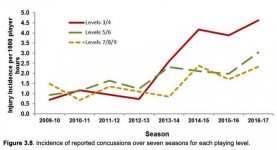mcroker
Rugby Expert
- Joined
- Apr 11, 2018
- Messages
- 362
- Post Likes
- 113
- Current Referee grade:
- Level 10
and here's the 2016/17 CRISP report:
https://www.englandrugby.com/mm/Doc...on_Report_2016_17_FINALforwebsite_Neutral.pdf
...and a little excerpt for those who don't get a kick out of reading such things...

https://www.englandrugby.com/mm/Doc...on_Report_2016_17_FINALforwebsite_Neutral.pdf
...and a little excerpt for those who don't get a kick out of reading such things...
...The average incidence of concussion over seasons 2014-15 to 2016-17 (average of 2.5 injuries/1,000player match hours) has been higher compared with the average over seasons 2009-10 to 2012-13(1.3 injuries/1,000 player match hours). This may be associated with changes in the characteristicsof the game which are related with concussion such as a greater number of contact events, or greaterlevels of intensity in these events. However, there is currently no evidence to demonstrate that thesefactors are increasing in the community game. This higher concussion incidence may also be due tothe raised awareness and diagnosis of this type of injury through the RFU ‘Headcase’ initiative whichhas been promoted extensively through the community game since January 2013...

Last edited:



